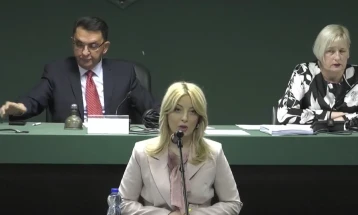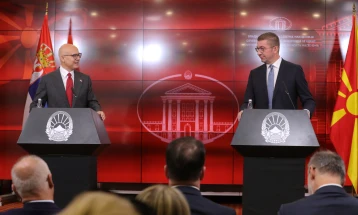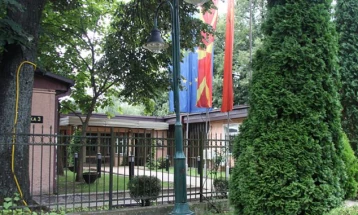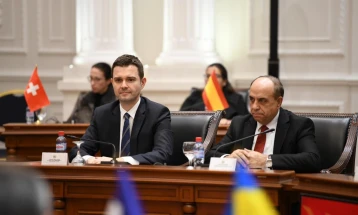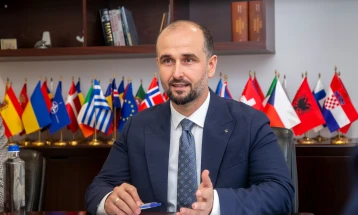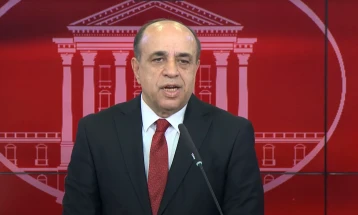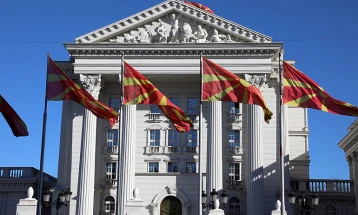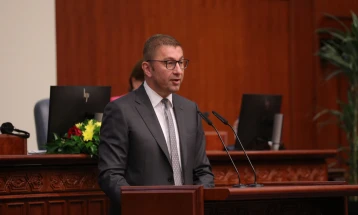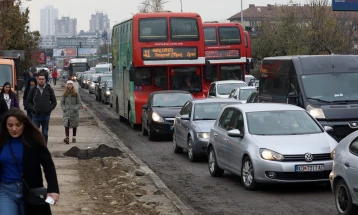U.S. applauds North Macedonia for defense spending, Ambassador Smith tells MIA
- The July NATO Summit in Washington will celebrate 75 years of working hand-in-glove as partners across the Atlantic but also talking about burden sharing and the fact that so many counties have worked so hard over the last decade to increase their defense spending, United States Permanent Representative to the Alliance, Ambassador Julian Smith, says in an interview with MIA.
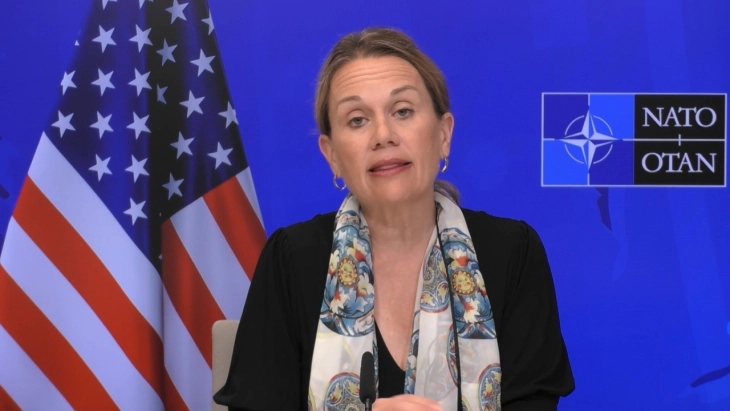
Brussels, 15 June 2024 (MIA) - The July NATO Summit in Washington will celebrate 75 years of working hand-in-glove as partners across the Atlantic but also talking about burden sharing and the fact that so many counties have worked so hard over the last decade to increase their defense spending, United States Permanent Representative to the Alliance, Ambassador Julian Smith, says in an interview with MIA.
"Here I really have to thank North Macedonia. This is a country that has taken some tough decisions to meet the commitment to spend two percent of GDP on its own national defense. North Macedonia is now above the threshold, above the two-percent mark and we applaud those efforts, but we applaud all of the countries that have done so," says Ambassador Smith.
She announces that a new report on burden-sharing that will be out probably next week will show that about two thirds of the alliance now spend over two percent of GDP on defense, "and that's important because it means that allies can meet their commitments across the Alliance".

"We will also talk about Ukraine at the Summit. We expect that President Zelenskyy will join us in person, and the Alliance will have some announcements about additional forms of assistance to Ukraine, political support, perhaps you have heard us talk about a bridge to membership. We are building a bridge to membership for Ukraine," says Smith.
She adds that every member of NATO are looking for ways to support Ukraine. Some allies are providing important humanitarian and economic assistance, many are providing security assistance, and even a higher number are providing all three forms of assistance.
"First, let me start by thanking North Macedonia for all of its significant contributions to Ukrainian forces. Those contributions have been absolutely critical and we applaud everything that North Macedonia has done and continues to do for the people of Ukraine," notes Smith.

According to her, allies have to be persistent and continue to look inward and identify either additional financial resources or actual capabilities that can be sent.
"I feel the commitment here across the Alliance that we must keep going that we cannot afford to stop because Ukraine needs our support ad they need to prevail at the end of the day and push Russia out of their territory," says Smith.
On Hungary's request to not be involved in the "new activity" that NATO is preparing in support of Ukraine, the U.S. Ambassador says this is not uncommon across the Alliance, because not every member of the Alliance participated in every single mission or activity throughout the 75 years.

"We don't find that terribly shocking. It is a practice that we've seen before but what's important is that Hungary maintains its commitments to the Alliance, it participates in other NATO missions, it maintains its commitment to spend two percent of the GDP on defense, and continues to be an active participant here inside the NATO alliance," says Smith.
The U.S. Ambassador also confirms that the summit will also decide on the successor of NATO Secretary General Jens Stoltenberg.
"Stoltenberg has served this Alliance with distinction for 10 years, and now the Alliance is prepared to salute him, celebrate his many contributions but also welcome a new Secretary General," says Smith.

The Alliance has been spending recent months looking at two official candidates - former Netherlands PM Mark Rutte and current Romanian president Klaus Iohannis.
"We have to reach a point where all 32 nations agree on the next secretary general, we are not quite there but are very close, and I suspect in the coming weeks we will reach a point where all 32 allies agree on who will be the next secretary general," says Smith.
The Ambassador also says a number of new policies tied to cybersecurity will be rolled out at the Summit. In 2016, the Alliance declared cybersecurity as a new domain, which means that Article 5 could apply to some sort of cyber-attack in the future.

"As is the case each time, the Alliance takes on a new issue, we start with a common shared appreciation of the nature of the challenge. So we've spent many years talking to allies what their experiencing is as it relates to cyber-attacks, and what national policies they have in place to either deter, prevent, or address cyber-attacks. After we spend some time actually assessing the problem, we then move to addressing it; and so right now we are trying to build a set of tools across the Alliance that will better equip us allies to cope with these types of attacks. We are drawing from national expertise as well as the expertise of some of our partners in faraway places. We are talking to our friends in Japan and South Korea about their own national cyber strategies. Cyber remains a key feature of our work here inside the Alliance. Watch very closely at the Summit, I think you're going to see four or five new policies. And certainly North Macedonia will benefit from those policies and also bring its own expertise into the Alliance," says Smith.
Regarding the statement of former U.S. President Donald Trump that, if elected, Washington would not stand in defense of those allies who fail to allocate sufficient defense funds if they were attacked, Ambassador Smith says there is deep bipartisan support for NATO across the United States.

"We welcome congressional delegations here on a regular basis, both from the Democratic and Republican parties, and all I see in those visits is a commitment to maintain US leadership in the Alliance, and maintain our active participation inside NATO. I don't know what will happen going forward, I can't predict the outcome of the US election, nor can I possibly predict how any candidate will act in the future. What I can assure you though is that the American public and Congress, both of those populations, continue to consistently express a deep commitment to the NATO Alliance," says Smith.
In the context of the EU bolstering its common European defense, with even the creation of a European army being contemplated, the U.S. Ambassador says the Union has undertaken a number of interesting and bold steps over the last couple of years to strengthen its internal defense and security policies, and the U.S. applauds everything they are doing for Ukraine and the amount of support coming from EU by providing lethal assistance, which is a major step forward for a body that does not have much experience doing that.

"EU is rolling out a number of new policies, and now has its own defense industrial strategy, it is also working to strengthen its own defense and security toolkit. Obviously to the extent that the EU is making strides forward in the area of defense, we are in essence looking at one set of forces, for example the Netherlands which is a member of both EU and NATO to the extent that the EU strengthens Dutch forces or to the extent that NATO does so, it benefits both institutions. So, we are quite comfortable with what the EU is doing," says Smith.
According to her, NATO has worked tirelessly over many decades to maintain what is a set of NATO standards, and to the extent that the EU is building capacity "we want to make sure that the EU relies on NATO standards going forward, and we obviously want to avoid unnecessary duplications".
"Since the war in Ukraine started, EU and NATO have been working hand in hand on supporting our friends in Ukraine and we expect that to continue. We certainly appreciate EU's desire to get at some of the fragmentation that exists in their defense industry, but we want them to remain open-minded about procuring equipment from non-EU member states, including the UK, USA, Norway, Turkey, and South Korea. I think in large part the US applauds and salutes the efforts underway downtown in Brussels, but we will continue to engage them in a dialogue to make sure there isn't any unnecessary duplications," underlines Ambassador Smith in the interview with MIA.
Sashko Panajotov
Video and photo: U.S. Mission to NATO/Andrej Brankovikj
